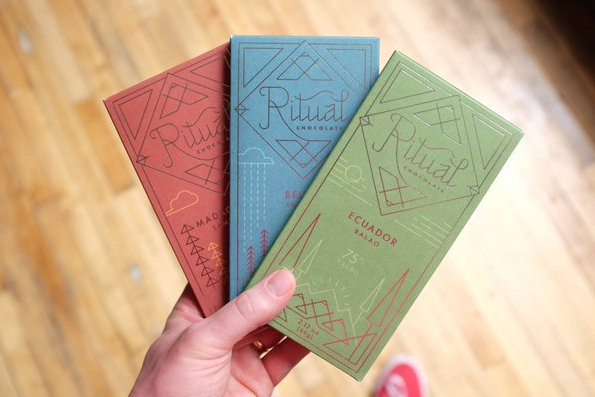It's hard to find a more natural pairing than coffee and chocolate. The similarities between the two are striking. Both are the seed of a fruit that only grows in tropical climates. Both are harvested, fermented, and roasted before taking the shape we're most familiar with. They're also delicious.
At Quills, we work hard to source and roast the best coffee possible so that you enjoy your morning cup all the much more. We value transparency, traceability, and quality. As such, it only makes sense to buy chocolate from companies that share our convictions. After blind tasting samples from a dozen different chocolatiers, we landed on three bean-to-bar brands to serve in our cafés: Ritual from Park City, Utah, Parlimant from Redlands, California, and Omnom from Reykjavik, Iceland.
Admittedly, we're not chocolate experts, so we digitally sat down with Matt Caputo of A-Priori Distribution to ask him some questions about craft chocolate.
How would you define bean-to-bar chocolate?
This is an important and somewhat nebulous terminology that is often abused. My definition is fairly straight forward. To be bean-to-bar the chocolate bar must be produced from raw cacao beans all the way through each production step at a factory owned by the brand in question. This does not mean chocolate like Idilio Origins or Original Beans, which is not produced by them is not absolutely special and worth supporting. Having Felchlin produce it for them with really special beans is smart and makes for high quality. Just not bean to bar. How is it different from the mass produced chocolate we all grew up eating? Bean-to-bar should not necessarily be equated to good. There are more bean-to-bar chocolate makers producing terrible product than there are making great chocolate. Sure most of the elite brands are bean-to-bar, but not all. Bean-to-bar should simply indicate you are talking to the artist in the flesh. Doesn't mean you will like their art. Unfortunately, there are so many brands that lie or at the very least stretch the truth about their bean-to-bar status. So many.
How is it different from the mass produced chocolate we all grew up eating?
Bean-to-bar should not necessarily be equated to good. There are more bean-to-bar chocolate makers producing terrible product than there are making great chocolate. Sure most of the elite brands are bean-to-bar, but not all. Bean-to-bar should simply indicate you are talking to the artist in the flesh. Doesn't mean you will like their art. Unfortunately, there are so many brands that lie or at the very least stretch the truth about their bean to bar status. So many.
What I think you are trying to get at with what makes bean to bar chocolate better than big chocolate we all grew up with is this. It should be about highlighting cacao beans of excellent provenance. Big producers do not. They use very poor beans and then use techniques (dark roast aka burned) and ingredients (too much extra cocoa butter and loads of vanilla) to create a flavor, rather than coaxing the flavor intrinsic to the beans out.
Just like wine is about honoring very special grapes grown in very special areas, so is chocolate with cacao beans. Most large chocolate producers make what I like to refer to as "vanilla flavored candy." Despite meeting certain technicalities of being called dark chocolate, I think it should be illegal to call it the same as what most bean-to-bar chocolate makers are doing.
What sort of flavors can we expect from craft chocolate?
Certainly a huge array of flavors. Just as many as you can from coffee, wine or cheese. In fact, chocolate shares a lot in common with terroir and production elements of all three of these fermented foods. All of the base flavors (sweet, savory, bitter, salty, acid) and a huge array of aromas (everything from chestnut tree blossom to horse blanket). In order to know what to expect, you need to know who made the chocolate as all chocolate makers have a "style" which is often the easiest thing to blind taste test and identify. You would also need to know the origin of the beans. Beans from the Sambirano Valley of Madagascar are always expected to exhibit tangy (acid) flavors and notes of citrus, red berries, etc. Beans like those from Camino Verde farm in Ecuador lack all acidity, are more earthy and savory with notes of fresh bread, brewers yeast, and cinnamon graham cracker. So what to expect is very broad, but certainly a journey through craftsmanship and terroir.
Do you recommend any coffee and chocolate pairings?
Absolutely. My primary recommendation is do not pair a coffee made with specialty beans and roasted responsibly with "vanilla flavored candy." Likewise, do not pair chocolate made with excellent cacao with coffee exhibiting symptoms of having been roasted on the surface of the sun. Beyond this, I do have some experience, but need to conduct more research! I will say since the two are such a natural fit the results of using my rule of thumb regarding matching the quality of the two have always been really enjoyable.












